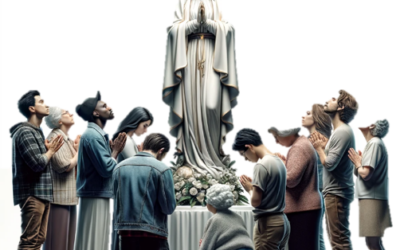Mormonism teaches that marriages sealed in their temples by their church authorities are binding for all eternity and will continue in heaven. Jesus Himself, however, explicitly denied that marriage continued on after death and resurrection,1 stating:
“You are mistaken, not understanding the Scriptures nor the power of God. For in the resurrection they neither marry nor are given in marriage, but are like angels in heaven,” (Matthew 22:29-30).
Yet Mormons try to find their teaching elsewhere. In particular, they claim that it is implied in Jesus’ words to the Apostles:
“Truly I say to you, whatever you bind on earth shall have been bound in heaven; and whatever you loose on earth shall have been loosed in heaven,” (Matthew 18:18).
So, when one binds a marriage on earth with this authority that Jesus gave, doesn’t that make the marriage binding in heaven also? Isn’t that Jesus’ point? Well, no. It’s not. The very fact that Jesus explicitly denied that marriage continues in the kingdom to come makes it clear enough that this is not what Jesus was talking about, but let’s look a little closer at the context to see just what the binding and loosing are in Matthew 18. The full paragraph reads:
“If your brother sins, go and show him his fault in private; if he listens to you, you have won your brother. But if he does not listen to you, take one or two more with you, so that by the mouth of two or three witnesses every fact may be confirmed. If he refuses to listen to them, tell it to the church; and if he refuses to listen even to the church, let him be to you as a Gentile and a tax collector. Truly I say to you, whatever you bind on earth shall have been bound in heaven; and whatever you loose on earth shall have been loosed in heaven. Again I say to you, that if two of you agree on earth about anything that they may ask, it shall be done for them by My Father who is in heaven. For where two or three have gathered together in My name, I am there in their midst,” (Matthew 18:15-20).
So, the “two or three” that are gathering in Christ’s name to “bind or loose” something are two or three witnesses to a man’s sin. This is not talking about just any and every scenario in life; it has a very specific context. And it doesn’t stop there. After Jesus taught this, more was said:
“Then Peter came and said to Him, ‘Lord, how often shall my brother sin against me and I forgive him? Up to seven times?’ Jesus said to him, ‘I do not say to you, up to seven times, but up to seventy times seven,” (Matthew 18:21-22).
Peter clearly understood Jesus’ words about binding, loosing, and two or three gathering as all still being about this idea of forgiving sins. Peter asks just how often he is to forgive the same man. Jesus graciously explains that the repentant should always be forgiven no matter how many times they have erred. He then continues, telling a parable about a man who is forgiven a great debt by his master but then refuses to forgive someone else for a very small debt. The parable concludes:
“Then summoning him, his lord said to him, ‘You wicked slave, I forgave you all that debt because you pleaded with me. Should you not also have had mercy on your fellow slave, in the same way that I had mercy on you?’ And his lord, moved with anger, handed him over to the torturers until he should repay all that was owed him. My heavenly Father will also do the same to you, if each of you does not forgive his brother from your heart,” (Matthew 18:32-35).
So this entire lengthy section is about forgiveness. It is about whether someone is bound to or relinquished from their sin debt. It has nothing to do with binding people in marriage any more than it has to do with binding inanimate matter through glue or welding. It doesn’t promise Christian welders that the binds of their welds will miraculously hold for eternity. That’s obviously not the kind of binding in view. Likewise, it isn’t promising that a minister who “binds” people in marriage with the proper authority will cause that marriage to last forever, even beyond death. It’s just not talking about anything like that. Jesus says:
“whatever you bind on earth shall have been bound in heaven; and whatever you loose on earth shall have been loosed in heaven,” (Matthew 18:18).
Just as he plainly says elsewhere:
“If you forgive the sins of any, their sins have been forgiven them; if you retain the sins of any, they have been retained,” (John 20:23).
The two statements are the same. The wording in Greek carries the sense that whatever you loose will have been loosed in heaven, not that it will afterward be loosed in heaven. It likewise says that what you bind will have been bound in heaven, not that it will afterward be bound in heaven. The idea here is not that we get to decide on our own whims to forgive or retain someone’s sin and God is then bound by our decision. Instead, it is saying that what we forgive has already been forgiven in heaven. When we release the repentant man from his sins, we are not acting on our own authority. We are doing it in Christ’s name. We are declaring what God has already done. This is why Peter followed up by asking Christ when exactly he should and should not forgive a man’s sin. All of that said, the context here is very specific. It is talking about pronouncements of judgment and forgiveness. It is talking about binding and loosing a man from his guilt. It is discussing forgiving and retaining sin. This passage has literally nothing to do with the bonds of marriage.





